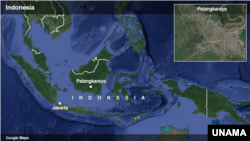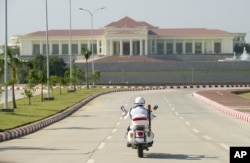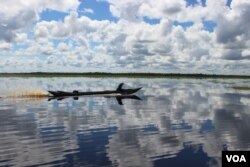For as long as Indonesia has been a country, it has dreamed of moving its capital.
Jakarta, once the seat of the medieval Sunda kingdom and then the Dutch colonial port of Batavia, was absorbed as the de facto capital by nationalist leaders in the 1940’s when Indonesia declared independence. But since then it has been an unending logistical nightmare. The world’s second-largest metropolitan region is sinking up to 18 centimeters per year. Its road coverage is much lower than that of other big cities, creating a near-permanent traffic jam. The "price" of this congestion has been estimated to be $11 billion by the Jakarta Transportation Agency.
Still, it is handily the biggest city and source of jobs in the nation, so it remains its economic center. And the slow pace of infrastructure development in the archipelago has led many to doubt that a project as ambitious as transplanting the capital to a different island would ever come to pass.
But 2017 seemed to mark a turning point for the capital relocation project. After years of landmark flooding, President Joko Widodo commissioned a survey from the National Development Planning Agency, or BAPPENAS, to look into sites in Central Kalimantan province on Borneo island. The chief candidate for a new capital is Palangkaraya, a Kalimantan city that even founding president Sukarno once hoped could replace Jakarta as the capital.
Widodo remained tight-lipped about the project but finally admitted on Twitter last year that “Discourses about the relocation of the state capital are now still in the analysis phase… Deep calculations are necessary so as to guarantee that the relocation will be really beneficial.”
Surveying Kalimantan
“We are still carrying out the study on what it would take to relocate the capital,” said BAPPENAS Minister Bambang Brodjonegoro, in his office last fall. “But it would be outside Java for sure.”
The island of Java is the economic and population center of Indonesia, somewhat at the expense of all its other islands, which number over 15,000.
“Preferably the new capital is in a central location within Indonesia, not too far East or West,” said Brodjonegoro, which would seem to rule out Sumatra, the largest island, west of Java, which is home to several important cities and considerable natural resources. “And with minimal risk of natural disaster, to the extent that it is possible in Indonesia… we are mostly looking in Kalimantan,” he admitted.
Although Indonesia is on the so-called “Ring of Fire,” its Borneo provinces are further from volatile tectonic plates and are thus less susceptible to volcanoes and earthquakes that are a regular feature of life in Indonesia.
Just last week, the governor of Central Kalimantan, Sugianto Sabran, said that his province is preparing 500 hectares of land in Palangkaraya, Gunung Mas Regency and Katingan in the event that the government moves the needle on relocation in 2018.
Many Precedents
Many countries have moved their capitals throughout modern history, including even the United States, whose first capital, before Washington D.C. was constructed, was in Philadelphia. In Southeast Asia, Myanmar quietly — some say too quietly — relocated its capital from Yangon to Naypyidaw in 2005. Egypt is building a brand-new new capital in the desert outside Cairo.
But for some critics, the dream to relocate Indonesia’s capital is more a leftover postcolonial aspiration than a realistic or necessary project.
“Among Indonesian nationalists… there's a great deal of anxiety because Indonesia punches well below its weight internationally. The reality is in stark contrast to the propaganda which dated back to the Sukarno era that Indonesia is a great nation, perhaps one of the greatest in the world,” said the writer Johannes Nugroho. “The anxiety explains the current nostalgia for the Sukarno era, which is believed by most Indonesians to be a time when Indonesia was a major player on the international stage,” he said. “I think the desire to revisit Palangkaraya as a new capital city stems from the same nostalgia, to finish what Sukarno started… [Sukarno] probably thought the best solution would be to cut the cord, as it were, with the past and start afresh with a new capital city.”
Various costs
There would be great economic and geopolitical costs to moving the capital to Kalimantan. For one thing, Borneo is already shared between Indonesia, Malaysia, and Brunei, a fraught balance that would be affected if one of those countries decided to govern from there.
Central Kalimantan also has very low sea access for the seat of a nation comprised entirely of islands.
Moreover, “political parties would have to move out. Courts and Supreme Courts would also have to move, aside from the president. Military bases would also have to move. There would be hundreds of thousands who would need housing and offices,” as Indonesia’s Vice President Yusuf Kalla said last year.
And finally, developing Palangkaraya or a nearby city to house a new capital would aggravate environmental degradation on Borneo. The biodiverse island has been particularly hard-hit by deforestation due to palm oil and other industries, and it is home to dozens of critically endangered species like the Borneo orangutan.
Jakarta is already something of a lost cause in terms of infrastructure, according to many observers. It is possible, then, that relocating the capital would not just leave one mess behind, on Java, but also create a whole new one in its place in Borneo.








